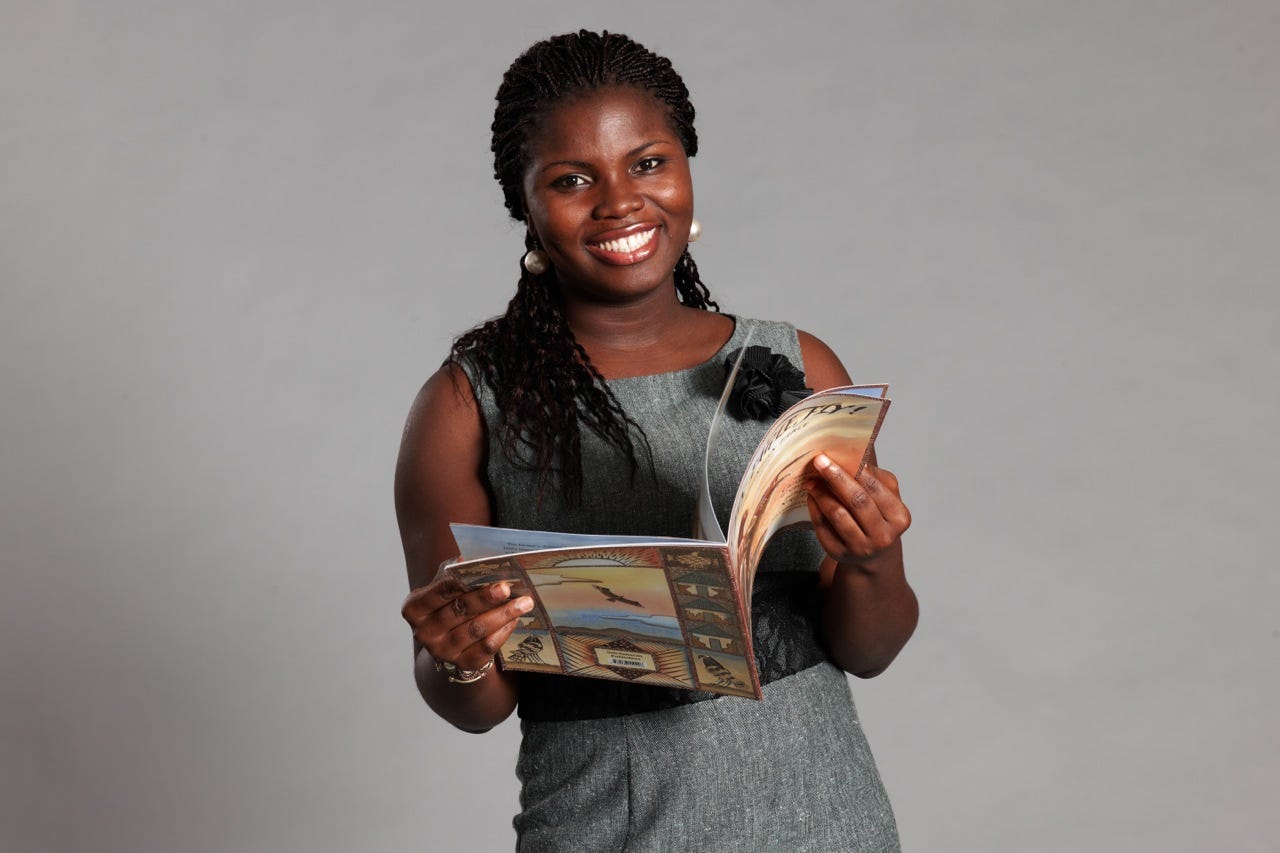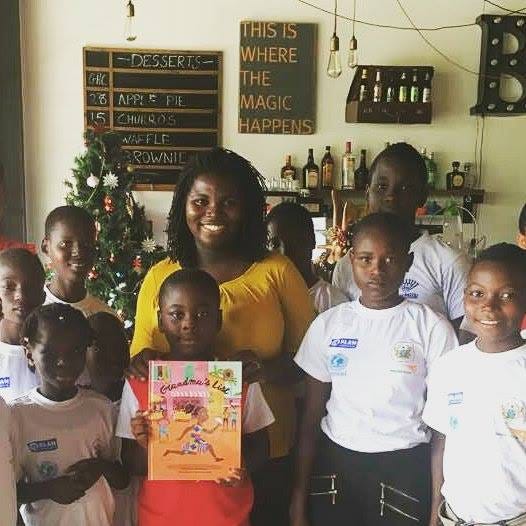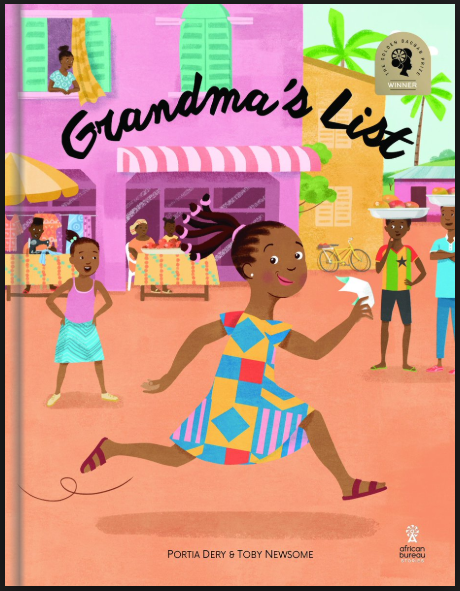Portrait of a GroundBreaker: Deborah Ahenkorah
Deborah Ahenkorah is the Founder of Golden Baobab, a literary nonprofit social enterprise increasing African representation in children’s literature. Golden Baobab finds and supports the continent’s most talented writers and illustrators through the Golden Baobab Prize and connects them to publishing opportunities and skills development training. Deborah is passionate about producing high-quality content that inspires the imaginations of African children in a celebration of African heritage and cultures. On this week’s feature of GroundBreakers’ Portraits of a GroundBreaker Series, our discussion with Deborah ranged from the importance of mentorship in the social entrepreneurship space to the growing literature scene in Accra.
What motivated you to start Golden Baobab?
I started Golden Baobab because I loved reading books when I was growing up and they played a huge role in my educational success. I had grown up in Ghana loving books but not being able to afford them. When I was young I came across a library that meant everything to me.
When I finished high school in Ghana, I got a scholarship to attend Bryn Mawr College in the U.S. At Bryn Mawr I met a woman who was building a library in Ghana and had the opportunity to help build a library and give children the same experience that I had had growing up.
With time I came to realize that the reason libraries in Africa are built with books from all over the world is because there’s a book shortage in Africa. An important way to solve this book shortage is for Africans to write stories in high abundance that are comparable to any of the best stories in the world. That’s why Golden Baobab was born, to find the African literary giants of the next generation and the children’s literature space and support their work.
For African children, there aren’t many windows into different African cultures that can be accessed through books. For children all over the world, there aren’t many books that serve as windows for them to learn about Africa. We can hopefully provide some of those windows through our work and inspire other people to also join the movement. I started with a goal of wanting anyone to be able to walk into any bookstore in the world and find high quality African children’s books that we have helped to produce.
What advice would you give to young people who want to become social entrepreneurs?
You’ve got to prepare your mind for it. There are a lot of people who have large aims and then quit when the work becomes difficult. I decided to be one of the ones who stick it out. My question for young social entrepreneurs is: which one will you be — a founder who sticks out their dream or a founder who quits when it gets tough? If you’re going to peace out when it gets tough then maybe don’t even start. As a social entrepreneur you are working on issues that have impact and touch people’s lives. Don’t raise people’s hopes if you won’t follow the work through and if you will then make sure you prepare a mind to stick it out to the end. The difference between those who succeed and those who fail are that those who succeed just never gave up.
The number one priority for me is producing stories that inspire children’s imaginations and transport them into a space where they are the master of that world in their imagination. I want to create beautiful spaces in the heads of children.
Africa is incredibly diverse — what are the potentials in teaching children about different African heritages through books?
What is so exciting about our vision is that it is Pan-African. I would have loved as a little girl to have been reading stories from around the continent, for example about a detective series set on the coast of Maputo.
We have such beautiful cultures across this vast continent and to have the opportunity to collect stories from all over Africa and make them available to children so that we all can grow up knowing and loving our own cultures is a gift.
I’m honored to do this work but have also braced myself for the challenge. It is difficult enough to start a publishing house in one country and will be many times more difficult trying to do that across the continent.
Over the past 10 years we’ve had incredible success with the literature prize and expect the same success with our publishing house as well. We have four books out already and we are already Pan-African. Our first book Grandma’s List is by a Ghanaian writer and South African illustrator. Another book is by a Tanzanian writer and an Egyptian illustrator with another by a Nigerian illustrator and South African writer.
The number one priority for me is producing stories that inspire children’s imaginations and transport them into a space where they are the master of that world in their imagination. I want to create beautiful spaces in the heads of children. This is a broad agenda and encompasses telling traditional tales in a fresh way and providing girls with books that feature girls or boys with books that feature girls. The broad goal is to create books and stories that create a space in children’s minds that they can escape into.
Who are some of the people who inspire you in your work? Some of your mentors?
I’ve been blessed with an abundance of extraordinary mentors, many of whom have been women. My co-founder Rama Shagaya has been an incredible support and mentor. I had this idea as a college student and she supported it and helped me get on my feet and that’s something I’m always grateful for.
The library I grew up attending was built by a Canadian woman named Kathy Knowles. When she lived in Ghana, children in her neighborhood would want to read the books she was reading to her children. She would invite them over to read and when she had to leave Ghana she set up a little library. Today she’s built an organization that has 10 highly effective libraries across Ghana. She’s published over 20 children’s books and I draw a lot of inspiration from her work.
Maya Ajmera has also been an incredible mentor. She is the founder of the Global Fund for Children and I interned with her as a college student. She has been a great support and connected me to funding opportunities.
I’m passionate about mentorship in the social enterprise space as this is a difficult space and social entrepreneurs need support. I started this organization right out of college and sometimes found myself in situations where I would desperately need help. For example I would be travelling for a book fair and in need of a place to stay and the only people available would be male publishers.
Because of this I was put in several compromising situations. I swore to myself in those experiences that I would do well in this industry because if 15 or 20 years down the line there was a young woman like me asking for help, her options would not be all men. Mentorship, and particularly gender specific mentorship, is undervalued in the social entrepreneurship space.
“My question for young social entrepreneurs is: which one will you be — a founder who sticks out their dream or a founder who quits when it gets tough?…The difference between those who succeed and those who fail are that those who succeed just never gave up.”
What is the current demand for children’s books?
The demand is growing, which is very exciting. I’m producing these books for the next generation including for my friends and their children. People of my generation across the African continent are having more disposable income. Historically, that lack of disposable income has stalled the growth of this industry. In most African countries, the publishing industry is largely educational and a big reason for this is a shortage of disposable income in many homes.
What this means is that families prioritize buying educational books and may not have money left to invest in fiction and literature. As the continent grows and wealth increases, we can expect this growth to boost the demand. Technology has also opened up the possibility for people to access information.
How has technology played a role in the publishing industry and do you have plans to expand digitally?
Content is the most important in the publishing industry and how that content is delivered is more of a secondary issue. We can decide to deliver our content through various media and the question is which media avenues will reach the most African children? That is our priority. At the moment, digital is not the best way to reach the majority of African children. Digital is the easiest in terms of access but is not the most accessible for children. In the future we may see more children’s books published digitally and this could take off in Africa. We’d also be open to creating audio visual content in the future.
Our publishing house is still in the infant phase of its development and I want to be patient with our growth. I want to do things the right way. I’m building this organization for the long haul. The key thing is consistently finding good content and we can make decisions later about the delivery.
I am seeing a very exciting increase… People are fed up with not having what they want and they’re creating it. They’re creating festivals, book clubs and a whole space around literary arts and culture in Ghana that was not there 5 or 10 years ago.
Do you see a current moment of change for African agency and African ownership of image and narrative on the global scene?
I am seeing a very exciting increase. Around five years ago I was in Nigeria and there were all of these literature events happening at the time. I was jealous because in Accra we didn’t have anything like that happening. I expressed this to a publisher there and she said, “These events are happening in Nigeria because we are making them happen. If you want the same for Ghana, you have to make them happen.”
That is now happening. People are fed up with not having what they want and they’re creating it. They’re creating festivals, book clubs and a whole space around literary arts and culture in Ghana that was not there 5 or 10 years ago. Such events are at the bedrock of creating an industry, a market, and demand for this arts and literature space. When we started this is not what the scene looked like. It was very lonely and there was little support, with few other people to learn from. It’s now exciting because I’m going to other people’s book launches and am able to learn from how they do things. We can all learn from each other and it’s not as lonely as it used to be.





